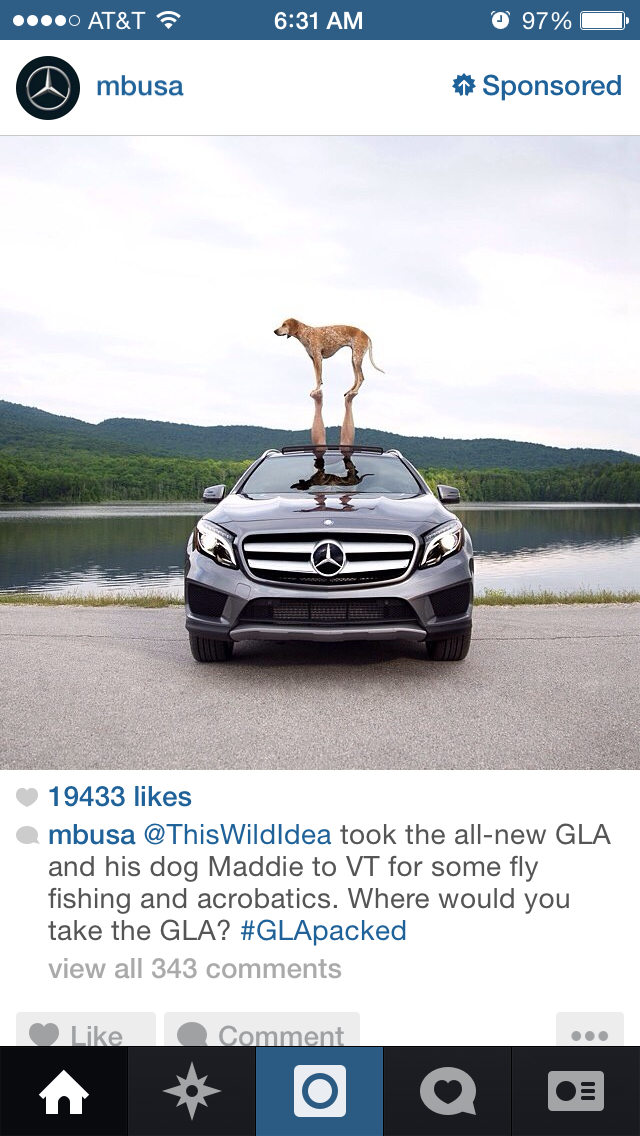
Like a brand’s ad on Instagram? Don’t be surprised to see more of its ads on Facebook some day.
Instagram is conducting a test with Mercedes-Benz that allows the luxury car brand to effectively target Facebook users who previously saw one of its Instagram ads, according to executives familiar with the campaign. Several other advertising agency execs who also recently met with Instagram said Instagram has discussed the test with them and intends to make the capability more widely available in the future.
Facebook, which owns Instagram, declined to comment, but a Mercedes-Benz spokesperson confirmed the test is taking place. The social network may finally be giving some real clues as to how it will go about integrating Instagram into its ad business.
Brands will likely soon be able to use Instagram and Facebook to work their way up the purchase funnel, too. A media agency exec involved in Instagram’s ad rollout said Instagram is developing a way for advertisers to show ads to Instagram users based on the ads they saw on Facebook.
One of the purposes of the test is to allow Mercedes — which began running ads on Instagram this month — to essentially A/B test creative on Facebook and Instagram and glean insight into what kinds of images perform better on each platform.
The new targeting is, for now, just a test. But if Facebook’s history is any indication, then this capability will become a mainstay feature if it yields compelling results. The potential is to be seen, but Facebook could start to use its vast trove of user data in ways that are compelling for brand-building objectives, beyond direct-response marketing. Allowing Instagram advertisers to subsequently target audiences on Facebook — where targeting is far more precise — gives Facebook ownership over all parts of the purchase funnel. Brands could use Instagram for brand awareness, then Facebook for their direct-response messaging.
As for ad revenue, this is a savvy, if not predictable, step in the evolution of the two platforms. Instagram has a fashioned itself a platform exclusively for upper-funnel, brand-awareness campaigns since it introduced ads last October.
But the synergy is also a departure from Instagram’s pledge to keep its user data separate from Facebook’s. Just last month, Instagram announced it had migrated 20 billion of its users’ photos to Facebook servers. At the time, Instagram co-founder Mike Krieger was adamant that Facebook would not use Instagram data to target ads.
“One of the things we had to do was really silo the information, which ends up being important for privacy and other reasons,” Krieger said in a June interview with Wired U.K.
While the test may be a blatant deviation from that statement, it is not in violation of Instagram’s terms of service. Instagram’s Q&A page about how ads on Instagram work clearly states Instagram’s intention to share user data with Facebook in the name of growing its advertising business.
We want to show ads from businesses that are interesting to you, and to do that we will use information about what you do on Instagram and Facebook (our parent company). For instance, this might include the people you follow and the photos and videos you like on Instagram, and your interests and other basic info on Facebook.
Everyone on Instagram will see ads from time to time whether or not they’re Facebook users, and basic information from Facebook helps create a more relevant experience.
More in Media

In Graphic Detail: The scale of the challenge facing publishers, politicians eager to damage Google’s adland dominance
Last year was a blowout ad revenue year for Google, despite challenges from several quarters.

Why Walmart is basically a tech company now
The retail giant joined the Nasdaq exchange, also home to technology companies like Amazon, in December.

The Athletic invests in live blogs, video to insulate sports coverage from AI scraping
As the Super Bowl and Winter Olympics collide, The Athletic is leaning into live blogs and video to keeps fans locked in, and AI bots at bay.





